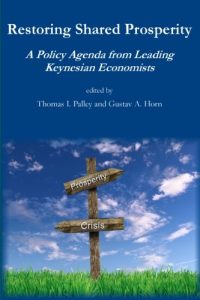
In the U.S., the economic recovery since the Great Recession has remained sub-par and beset by persistent fear it might weaken again. Even if that is avoided, the most likely outcome is continued weak growth, accompanied by high unemployment and historically high levels of income inequality. In Europe, the recovery from the Great Recession has been even worse, with the euro zone beset by an unresolved euro crisis that has already contributed to a double-dip recession in the region. This book offers an alternative agenda for shared prosperity to that on offer from mainstream economists. The thinking is rooted in the Keynesian analytic tradition, which has been substantially vindicated by events. However, pure Keynesian macroeconomic analysis is supplemented by a focus on the institutions and policy interventions needed for an economy to generate productive full employment with contained income inequality. Such a perspective can be termed “structural Keynesianism”. These are critical times and the public deserves an open debate that does not arbitrarily or ideologically lock out alternative perspectives and policy ideas. The book contains a collection of essays that offer a credible policy program for shared prosperity, rooted in a clear narrative that cuts through the economic confusions that currently bedevil debate.
Author: Dr Thomas I. Palley
Edition: 1
Binding: Paperback
EAN: 9781493749423
Condition: New
Manufacturer: CreateSpace Independent Publishing Platform
Number of items: 1
Number of pages: 208
Product group: Book
Studio: CreateSpace Independent Publishing Platform
Publication Date: 2013-12-18
Publisher: CreateSpace Independent Publishing Platform
Pages: 208
ISBN: 1493749420
 Heterodox
Heterodox
